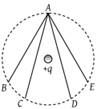Point charge q moves from point P to point S along the path PQRS (figure shown) in a uniform electric field E pointing co-parallel to the positive direction of the x-axis. The coordinates of the points P, Q, R, and S are and (0, 0, 0) respectively. The work done by the field in the above process is given by the expression

(1) qEa
(2) – qEa
(3)
(4)

Inside a hollow charged spherical conductor, the potential -
1. Is constant
2. Varies directly as the distance from the centre
3. Varies inversely as the distance from the centre
4. Varies inversely as the square of the distance from the centre
Two small spheres each carrying a charge q are placed r meter apart. If one of the spheres is taken around the other one in a circular path of radius r, the work done will be equal to
1. Force between them × r
2. Force between them × 2πr
3. Force between them / 2πr
4. Zero
Two charged spheres of radii 10 cm and 15 cm are connected by a thin wire. No current will flow, if they have -
1. The same charge on each
2. The same potential
3. The same energy
4. The same field on their surfaces
The electric potential V at any point O (x, y, z all in metres) in space is given by . The electric field at the point in volt/metre is -
1. 8 along negative x-axis
2. 8 along positive x-axis
3. 16 along negative x-axis
4. 16 along positive z-axis
A hollow metal sphere of radius 5 cm is charged so that the potential on its surface is 10 V. The potential at the centre of the sphere is -
1. 0 V
2. 10 V
3. Same as at point 5 cm away from the surface
4. Same as at point 25 cm away from the surface
If a unit positive charge is taken from one point to another over an equipotential surface, then -
1. Work is done on the charge
2. Work is done by the charge
3. Work done is constant
4. No work is done
In the electric field of a point charge q, a certain charge is carried from point A to B, C, D and E. Then the work done

1. Is least along the path AB
2. Is least along the path AD
3. Is zero along all the paths AB, AC, AD and AE
4. Is least along AE
A conductor with a positive charge:
| 1. | is always at +ve potential. |
| 2. | is always at zero potential. |
| 3. | is always at negative potential. |
| 4. | may be at +ve, zero or –ve potential. |
On rotating a point charge having a charge \(q\) around a charge \(Q\) in a circle of radius \(r,\) the work done will be:
| 1. | \(q \times2 \pi r\) | 2. | \(q \times2 \pi Q \over r\) |
| 3. | zero | 4. | \(Q \over 2\varepsilon_0r\) |






